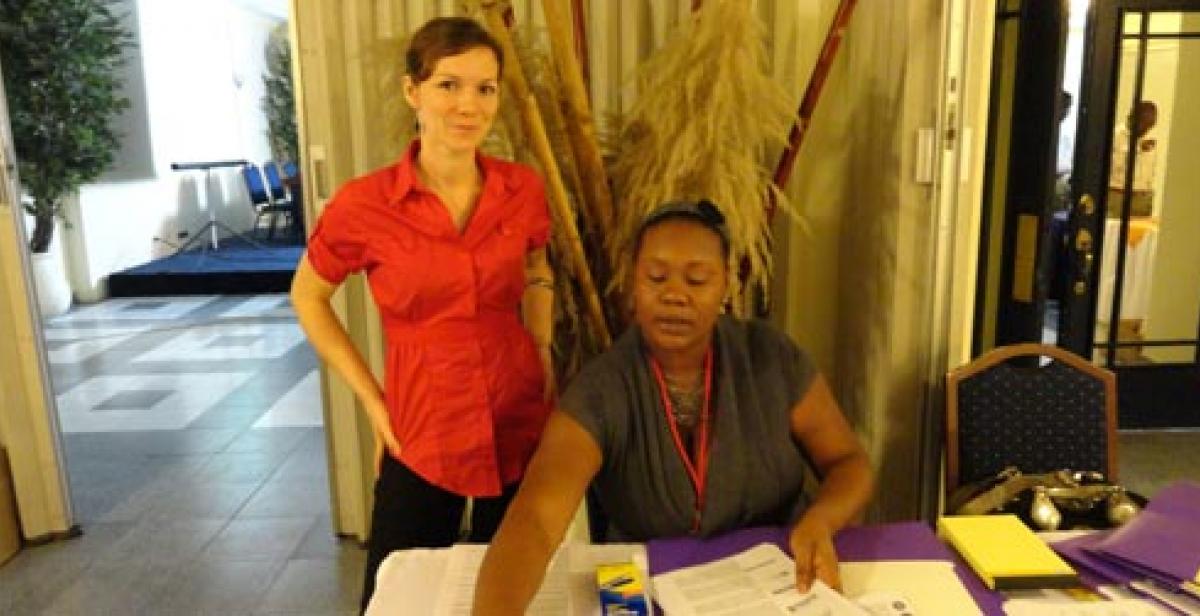Esther is a Specialist in Monitoring of Public Policy and Advocacy, working alongside the Centre for Research, Reflection, Training and Social Action (CERFAS), based in Port au Prince, Haiti.
What inspired you to become a development worker with Progressio?
I have been interested in global development issues for many years and open to experiences that contribute to my understanding of the ‘full picture’. I was therefore looking for an experience in a completely new context.
The idea of working with Progressio, but at the same time directly with and inside a Haitian organisation seemed particularly attractive to me, also because this is very helpful in order to fully immerse into the country’s daily life and culture. Especially in a country like Haiti, where most foreign aid is channelled through international agencies, many local organisations feel left out of international development and hardly have access to international aid money. Yet, it is those actors who are going to stay in the country as the real motor of a sustainable and structural development effort. Therefore their point of view in a context like the Haitian post-earthquake reconstruction is the one that cannot be omitted.
What made the biggest impact on you when you first arrived in Haiti?
Having arrived one year after the earthquake I was obviously very struck by the tent cities and the debris that were still all over Port au Prince and its surroundings.
However, once I went out of this area, I found another Haiti, the one whose pictures aren’t shown on the international news. There is beautiful mountains, great artists, good food and very hospitable people.
What do you enjoy most about your role?
Working within CERFAS, I am fascinated by the analysis we are conducting of post-earthquake reconstruction and general development issues in Haiti. This research helps me to get a real insight into the local as well as the international point of view on those topics.
In view of the large number of development and charity organisations that are currently working on the ground, interpretations of the different trends and projects vary. My position allows me to step back from euphemistic project descriptions or one-sided pictures in order to get an overview of the complexity of the situation.
What has been the most exciting moment so far?
In coordination with regional civil society movements that work on aid effectiveness, we organised a two-day conference in November 2011. Although most participants were not familiar with the theoretic aspects of the subject (eg the Paris Declaration on Aid Effectiveness), we had an unexpectedly high number of attendants. This made me realise the importance of the subject for the average citizen, because everybody feels very concerned about the reconstruction and development of their country.
And the biggest lesson?
Never take anything for granted. Things are not black or white in Haiti, you always have to challenge the information you receive and put it into perspective according to the different points of view.
What is the biggest development challenge facing the country where you are working and the area in which you are working?
To have stable and strong Government institutions which are actually leading Haiti’s social and economic development processes. More than half of the Haitian budget is currently financed by international aid; this requires a strong alignment of activities on the objectives of the different donors instead of one common national development approach.
There is unanimity that the reconstruction process largely relies on a strong governmental leadership and a mobilisation of all national forces. Most particularly, this means the creation of sustainable employment and other opportunities that will allow Haitians to fully participate in the development of their own country.
If you could change one thing, what would that be?
Nothing, although Haiti is not always an easy place to live, this experience helps me to grow through its different challenges. It’s warm, friendly and creative people make up for a lot of inconveniences due to deficient structures.
What strikes you most about Progressio’s development worker model?
That it is not about ‘helping passive beneficiaries’ for a period of time, but about contributing – together with my colleagues and our organisation’s local partners - to the creation of strong civil society movements, which are indispensable in order to advocate for more accountability and to counterbalance existing power structures.
What advice would you give to someone who is thinking of becoming a development worker?
Living directly immersed in a very different culture makes you realise new aspects of yourself and can be very challenging. Yet, at the end of the day, it becomes an experience that helps us to grow and realize that international development can only be a mutual exchange.



